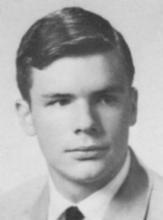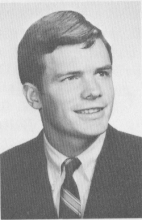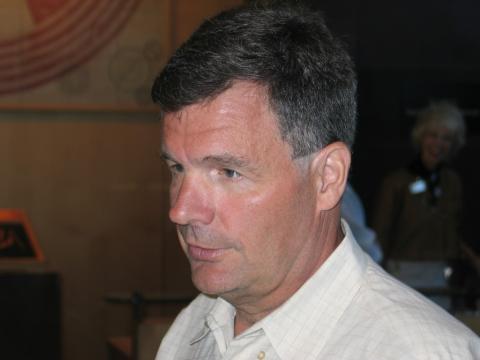

Here is his obituary in the Washington Post.
David Burwell, the co-founder and first president of the Rails-to-Trails Conservancy, a Washington-based organization that has led nationwide efforts to convert thousands of miles of unused railroad corridors to trails and parklands, died Feb. 1 at his home in Bethesda, Md. He was 69.
He had complications from acute myeloid leukemia, said his wife, Irene Burwell.
Inspired in part by his mother, who helped create an 11-mile bike trail on Cape Cod, Mass., Mr. Burwell was instrumental in building a national movement to preserve green space and to provide options for alternative modes of transportation.
As thousands of miles of old railroad lines were abandoned each year, some communities across the country remade them as paths for bicycling and nature walks. The Rails-to-Trails Conservancy, which Mr. Burwell founded in 1986 with Peter Harnik, became the first group to coordinate national efforts to build such a network.
“It was David who turned ‘rails-to-trails’ from an idea with very good potential into a powerful national force backed by firm legal standing, true political muscle and undeniable financial backing,” Harnik said in a statement released by the conservancy.
The organization was launched with a $75,000 grant from environmental advocate Laurance Rockefeller, who called Mr. Burwell “a fireball of energy and determination and talent.”
Mr. Burwell and Harnik persuaded officials from the Interstate Commerce Commission to develop regulations that eased the conversion of old rail lines to trails. With his training as a lawyer, Mr. Burwell helped untangle thorny right-of-way ownership issues across the country.
In the beginning, the rails-to-trails coalition fought road builders and other entrenched interests before it could claim a place as part of the nation’s surface transportation network.
“The idea of turning unused lines into a vibrant resource unites many people — hiking clubs, cyclists, wildlife advocates, political types who are community-oriented,” Mr. Burwell told the San Francisco Chronicle in 1997. “But you get long, skinny parks, cutting across several jurisdictions. Such things fall through the cracks of conventional government. Who has the current title? Who’ll fund the trail, who winds up managing it? That’s where we arrive, to provide expertise.”
In 1991, the conservancy won a major battle with the passage of the Intermodal Surface Transportation Efficiency Act (ISTEA), which mandated that a small portion of federal highway funds be reserved for projects other than paved roads. That money helped groups buy old railroad property, rip up the tracks or build new trails alongside existing rail lines.
Today, often in conjunction with the National Park Service, the conservancy has helped build more than 2,000 trails on more than 22,000 miles of rail corridors in all 50 states and the District. Another 8,000 miles of trails are in the planning stage. The longest trail, the John Wayne Pioneer Trail, stretches 253 miles in the state of Washington.
David Gates Burwell was born Sept. 14, 1947, in Boston and grew up largely in Falmouth and Woods Hole, Mass. His father was a doctor. His mother spent more than a decade spearheading the Shining Sea Bikeway, the rail-trail on Cape Cod.
Mr. Burwell received a bachelor’s degree in government from Dartmouth College in 1969 and a law degree from the University of Virginia in 1973. He practiced law in Boston and Vermont before working for a public interest advocacy group in Massachusetts.
He came to Washington in the late 1970s to work on transportation issues for the National Wildlife Federation. He stepped down as president of the Rails-to-Trails Conservancy in 2001 to found the Surface Transportation Policy Project. He later worked as a consultant on transportation, the environment and urban policy before directing the energy and climate program at the Carnegie Endowment for International Peace from 2010 to 2014.
His first marriage, to Elizabeth Hennings, ended in divorce. Survivors include his wife of 16 years, the former Irene Ovchinnikova of Bethesda; her son, Victor Ovchinnikov, whom he adopted, of Watertown, Mass.; a sister and brother; and two granddaughters.
“My dream,” Mr. Burwell told a Rails-to-Trails Conservancy publication in 2006, “is that one day you could go across this entire country — old or young, handicapped or able — on flat, wide, off-road paths. I want rail-trails to be America’s main street.”
(Here is his obituary reprinted from The Falmouth Cape News):
David Gates Burwell, 69, a former resident of Falmouth, died February 1 at his home in Bethesda, Maryland, after a three-year battle with acute myeloid leukemia.
A lawyer and longtime advocate for transportation and climate policy reform, he was co-founder of the Rails-to-Trails Conservancy and most recently served at the Carnegie Endowment for International Peace as director of its energy and climate program.
Born in Boston in 1947, he was the son of Dr. E. Langdon Burwell and Barbara (Gates) Burwell. He moved to Falmouth in 1954, when his father started a practice in internal medicine. In 1957 the family moved to Woods Hole, where they lived in the home built by his maternal grandmother, Dorothy Olcott Elsmith.
He attended Falmouth public schools, graduating from Lawrence High School in 1965. He was president of the student council and co-captain of the Lawrence High soccer and tennis teams; the tennis team was undefeated during his four-year high school career.
In 1969 he graduated from Dartmouth College, where he received a bachelor of arts degree with honors in government. He then earned a juris doctor degree from the University of Virginia in 1973. While at Virginia he served on the board of the Virginia Journal of International Law.
He was admitted to the bar in Massachusetts, Vermont and Washington, DC.
Early in his career, while working at MassPIRG, he co-authored “The End of the Road: A Citizen’s Guide to Transportation Problem-Solving,” published in 1977.
He then moved to Washington, DC, and worked for the National Wildlife Federation, where he became the director of the transportation and infrastructure program. He was at the National Wildlife Federation when he learned that numerous railroad rights-of-way across the country were about to be abandoned, and he immediately focused his attention on preserving them for future use as public hiking and biking trails.
Mr. Burwell had witnessed his mother’s many years of work on a successful campaign to create the Shining Sea Bikeway in Falmouth in 1973 and that was his inspiration to found the Rails-to-Trails Conservancy in 1986. He served as its chief executive officer until 2001. During his tenure at Rails-to-Trails Conservancy the nation’s system of rail-trail projects blossomed from less than 1,000 miles to more than 15,000 miles of trails and greenways.
While at Rails-to-Trails Conservancy he also established the National Transportation Enhancements Clearinghouse, an information center that provided technical assistance and research support to active transportation projects under the ISTEA (Intermodal Surface Transportation Efficiency Act) of 1991 program. From 2001 until 2003 he was the CEO of the Surface Transportation Policy Project, a volunteer transportation policy reform coalition that played a critical role in the enactment of ISTEA.
From 1992 until 1998 he served on the executive committee of the Transportation Research Board, the transportation research arm of the National Academy of Sciences. He served as chairman of the Sustainable Transportation Task Force and on the Transportation Research Board panel that produced Special Report 257 Towards a Sustainable Future (1998).
He was also on the board of advisers of the Institute for Transportation and the Environment at the University of California at Davis. In 2000 the Dartmouth Club of Washington, DC, awarded Mr. Burwell its Daniel Webster Award for distinguished public service.
In 2010 he began his tenure at the Carnegie Endowment for International Peace, where he oversaw numerous environmental policy projects with partners in China, Europe and elsewhere, and consulted for organizations working on bipartisan climate policy approaches. He directed a nonpartisan report on transportation policy reform, Road to Recovery: Transforming America’s Transportation, co-led by former US senator Bill Bradley, former governor Tom Ridge, and former US Government Accountability Office director David Walker, which outlined the restructuring and financing of federal transportation programs for environmental and financial sustainability.
He leaves his wife, Irene Burwell, of Bethesda, Maryland; his son, Victor Ovchinnikov and his wife, Elyse Beaulieu, of Watertown; two granddaughters; his sister, Beverly Burwell of Woods Hole; and his brother, Brian Burwell of Arlington.
Mr. Burwell was the brother of Don Burwell, who died in the Vietnam War.
A memorial service in Woods Hole is being planned for spring.

These classmate obituary pages are our attempt to honor and remember classmates who have passed away. We have attempted to find and share a public obituary and have added some photos and classmate comments. In some cases we have not been able to find an obituary. If you know of an obituary where one is missing, please let us know. If you have a remembrance you think is important to share, please let us know. Comments can be submitted through the Contact Us form on this web site.